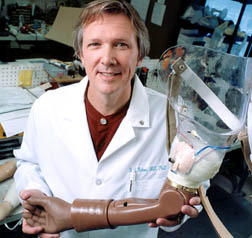JAMA Study Reveals Further Refinement of Bionic Arm
 |
| Dr. Todd Kuiken |
The Rehabilitation Institute of Chicago (RIC), the nation’s #1 rehabilitation hospital, announces its Center for Bionic Medicine has harnessed a new pattern recognition technique that allows quicker and more refined control for myoelectric arms used in combination with the Targeted Muscle Reinnervation (TMR) procedure, which allows patients to control prosthetic arms simply by thinking about it.
“The use of pattern-recognition control is an exciting advancement for patients with arm amputations. It will allow us to decode more neural information from the patients providing enhanced, more natural operation of their prostheses,” said Todd Kuiken, MD, PhD, associate professor of physical medicine and rehabilitation and of surgery at the Feinberg School of Medicine, and director of the RIC Center for Bionic Medicine. “This neural interface, used in combination with the U. S. Department of Defense’s Advanced Research Projects Agency’s new sophisticated prosthetics, is creating better patient independence and supporting RIC’s vision to advance human ability.”






